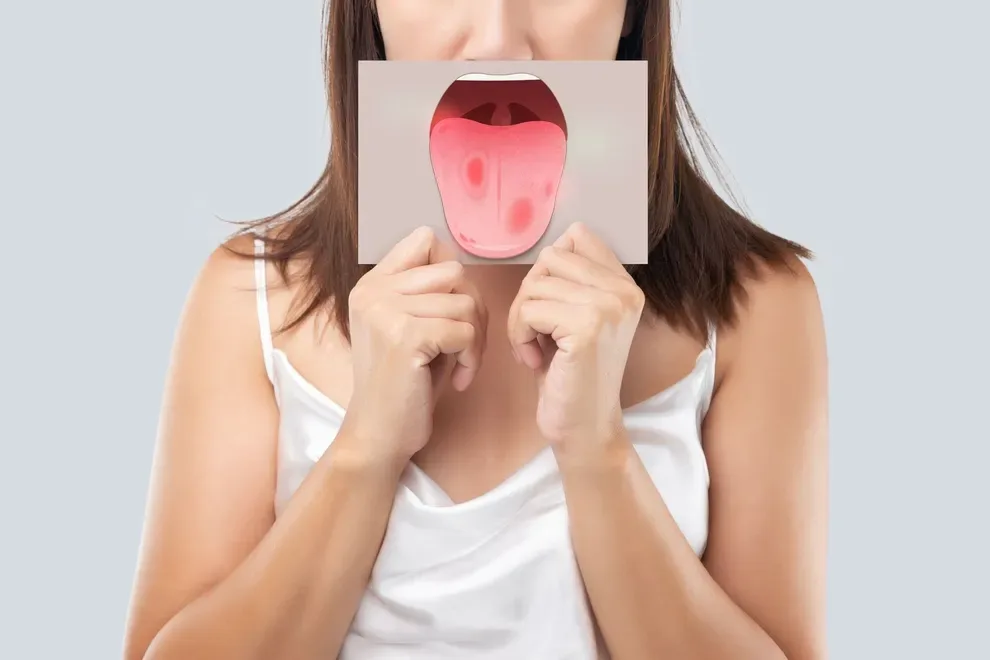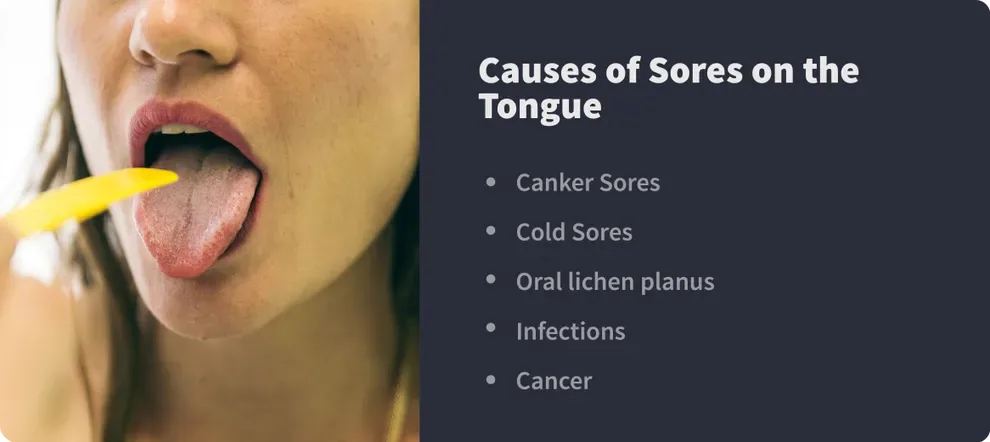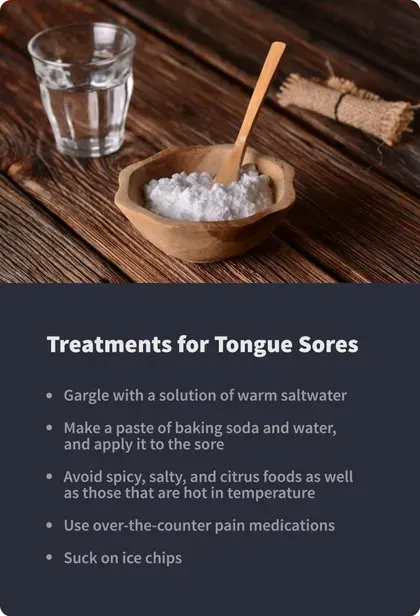How to Identify & Treat Sores on the Tongue

Table of Contents
- Signs of Sores on the Tongue
- Causes of Sores on the Tongue
- Sore vs. Blister
- Sore Bump on the Tongue
- Treatment Methods
- Preventing Sores
You can usually tell when you have a sore on your tongue, as it will often be painful or irritated at the site. The area may feel bumpy or swollen.
Sores on the tongue can be caused by cold sores, canker sores, infection, injury, or (less commonly) cancer. Modifying your diet, limiting alcohol and tobacco products, and practicing good oral hygiene can help to prevent sores on your tongue from forming.
Sores on your tongue are not typically serious and will often clear up on their own without you even needing to do anything. They can be painful and uncomfortable for a week or two though. It can help to use topical treatments and home remedies to reduce the irritation.
Signs of Sores on the Tongue
Most of the time, sores on the tongue are related to minor conditions, such as injury, canker sores, or cold sores. They can occasionally signal a bigger, more serious, underlying condition, so it is important to pay attention to them.
Signs that you have a sore on your tongue can include the following:
Pain or irritation in a certain spot
Redness or swelling
Bleeding from the tongue
Difficulty chewing or swallowing
Gray, yellow, white, or red spots on the tongue
If the sore on your tongue does not go away within a week or two, it keeps coming back, or you experience additional symptoms, such as fever or flu-like symptoms, consult with your doctor.

Causes of Sores on the Tongue
A sore on the tongue can be caused by biting your tongue or a minor injury or cut to the tongue. It can also be caused be a variety of other factors such as these:
A canker sore is one of the most common causes of sores in the mouth. These can occur on the tongue, gums, or insides of your cheeks. They can appear white, yellow, or gray in color. They are often caused by some sort of immune system reaction. They are small ulcers that will generally clear up on their own.
These are also called fever blisters. They generally occur on the outside of the lips, but they can also be on the tongue.
Cold sores are caused by the herpes simplex virus type 1 (HSV-1). It can cause blisters that rupture to form sores on the tongue. They are part of a herpes outbreak and highly contagious. They typically go away within a week or two.
This is a chronic disease that can affect the oral cavity, including the tongue, causing sores and ulceration that can lead to pain. It can also cause patches that are white or lace-like and itch, as well as swollen and peeling gums, and raised red purple or red plaques on the body.
This condition is likely caused by genetics, stress, injury, or viral infection. The symptoms of oral lichen planus may need to be managed by a medical professional, depending on their severity.
Sores on the tongue can be caused by infections, such as hand, foot, and mouth disease, which is highly contagious and typically impacts children. There are no specific treatments for this condition. Most often, it clears up on its own within a week or so.
A less common cause of sores on the tongue can be mouth cancer, which can cause lesions or ulcers to form on the tongue. The tongue is one of the main sites that mouth cancer can present.
Sores on the tongue can also form due to treatment methods for mouth cancer.
If you ever experience a bright pink color on the tongue it is most often due to a deficiency in iron, folic acid, or vitamin B-12, but it can also be an allergic reaction to gluten.
Sore vs. Blister on the Tongue
If you have a painful bump on your tongue, you may be unsure if it’s a sore or a blister. But it’s important to know which type of lesion you are experiencing, especially since cold sores (also known as fever blisters) are highly contagious and may require ongoing care and treatment as they are caused by an infection from the herpes simplex virus.
Sores on the tongue are most commonly caused by canker sores, which come in varying degrees of severity but are not contagious. They usually heal without intervention.
However, sores can also be caused by infections (including the very contagious hand, foot, and mouth disease) and even cancer, so it’s important to be aware of recurring sores as well.
Sore Bump on the Tongue: Is it a Canker Sore or Fever Blister?
If you’re trying to determine whether the bump on your tongue is a canker sore or fever blister (cold sore), consider the following:
Canker sores are usually yellow or white, and they only appear IN THE MOUTH – on the inside of the cheeks and lips, or on the tongue. They are painful and/or uncomfortable but usually small. Most often, they are oval in shape. Generally, they’ll heal in one to two weeks without scars.
Fever blisters (cold sores) are small blisters that are filled with fluid. They often form in groups or clusters, and most commonly occur ON or AROUND the lips, although they can appear on the tongue. They usually heal in two to three weeks without scars.
Treatment Methods

The treatment for a sore on your tongue is going to depend on what caused it in the first place. Most of the time, tongue sores heal on their own, and you will not need to do anything to treat them.
There are several methods you can use to alleviate some of the discomfort from these sores on your tongue.
Gargle with a solution of warm saltwater.
Make a paste of baking soda and water, and apply it to the sore.
Avoid spicy, salty, and citrus foods as well as those that are hot in temperature.
Use over-the-counter pain medications.
Suck on ice chips.
If the sore gets worse, does not go away, or you start experiencing additional symptoms, talk to your doctor.
Preventing Sores From Forming on Your Tongue
When it comes to prevention of sores on your tongue, again, this is partly determined by the cause of the sore. Often, mouth sores can be prevented by chewing carefully, avoiding overly hot food and beverages, practicing good oral hygiene (including using a soft-bristled toothbrush and fluoride toothpaste), and limiting your alcohol intake while avoiding the use of tobacco products.
Canker sores and cold sores are often triggered by a stress response. Keeping your stress levels low and practicing relaxation techniques may help to prevent sores from forming on your tongue.
